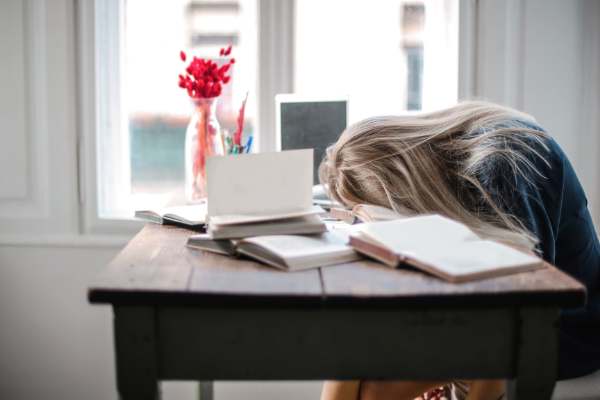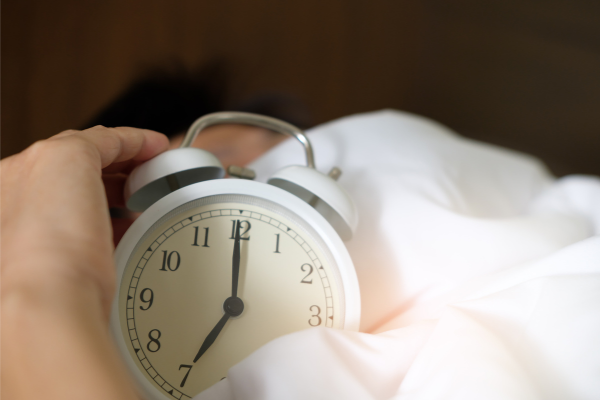Everyone wants a good night of rest. Sleeping well can make a major difference in your quality of life.
Unfortunately, there are many tidbits of information on sleep floating around out there that are just plain wrong. But people don’t realize this, so they follow the advice, hoping for a healthy change in their sleep pattern. But, alas, the opposite happens.
In today’s blog, we’re going to cover 20 common myths about sleep that could be harming your sleeping patterns.
How many have you heard?
1. Your body gets used to sleeping less
You can’t wean yourself off of sleep, or off of a certain amount of sleep. But research has demonstrated that both short- and long-term effects occur due to sleep loss, showing that the body can’t get used to sleeping less.

If you’re routinely sleeping less, you’ll feel tired throughout the day. And the next day. And every day that follows. Just because this becomes your new normal, it doesn’t mean your body is “used to it” or functioning as well as it would be if you were getting adequate sleep.
Instead, this constant state of sleep deprivation will impact cognition, harming creativity, decision-making, memory, focus, and learning. Over time, the lack of sleep can have even more dire consequences, impacting the cardiovascular system, metabolism, the immune system, hormone production, and mental health. [1]
So, even if you think you’re getting used to less sleep, you’re actually just getting used to being tired and your health is suffering as a result.
2. Many adults need no more than five hours of sleep per night
It may be nice to think that you can sleep less so that you can get more done, but the reality is that we need more than five hours of sleep per night to maintain our health and function optimally. Experts recommend that adults get anywhere between 7-9 hours of sleep per night. [2]
What’s interesting, however, is that a very small portion of the population – approximately 1 in 1 million – have a genetic mutation which allows for them to sleep for shorter periods of time and still feel refreshed. [3]
3. How long you sleep is all that matters
It may seem like it only matters how long you spend sleeping. While duration is important, sleep quality is just as – if not more – important.
Fragmented sleep – meaning multiple distractions throughout your sleep – can disrupt the sleep cycles, keeping you from spending enough time in the most restorative stages. [4]
The goal should be 7-9 hours of uninterrupted sleep.
4. It doesn’t matter when you sleep, as long as you sleep long enough
Who cares when you sleep, so long as you’re getting enough, right?

Your circadian rhythm cares.
This is your body’s internal clock and it determines when to release certain hormones, such as the ones that encourage sleep, and others that tell you it’s time to wake up and start your day.
Your circadian rhythm, also known as the sleep-wake cycle, is aligned with the 24-hour cycle of our days, meaning your body is programmed to sleep when it’s dark. Getting this timing right helps encourage better sleep, as well as metabolism, cardiovascular health, mental health, and overall health. [5]
Due to this, it’s best to sleep at night and to maintain a regular routine of when you go to bed and wake up.
5. A good sleeper doesn’t move at night
Minor movements throughout your sleep are completely normal.
The only circumstances in which sleep movement can be a cause for concern is when it’s chronic, abnormal (like sleepwalking), aggressive or violent, bothersome to sleep partners, or due to night terrors.
6. Your brain shuts down during sleep
Far from shutting down, your brain is actually going through a series of sleep stages each night. In fact, the brain activity seen during sleep is akin to brain activity when awake.
These shifts in brain activity while we sleep is thought to be crucial to effective thinking, memory, and emotional processing. [6]
7. Dreams only occur during the REM stage of sleep
The rapid eye movement (REM) stage of sleep tends to be the time when dreams can be at their most intense, but it’s certainly not the only stage of sleep that includes dreaming. [7]
Dreams in REM and other stages of sleep tend to vary, with more bizarre and vivid dreams taking place during REM. [8]
8. More sleep is always better
While some people may require more sleep than others for various reasons – such as recovering from an illness – sleeping a lot can actually be evidence of a deeper issue. Many underlying health conditions, such as diabetes, heart disease, and depression list sleeping too much as a symptom.
Sleeping too much is also linked to a higher mortality rate, though researchers aren’t fully sure why or how these two things are correlated. [9]
9. Snoring isn’t harmful
Light, occasional snoring isn’t anything to worry about. However, loud and regular snoring can be cause for concern.
Loud, frequent snoring may not only disrupt your sleeping partner, but it can be a sign of obstructive sleep apnea, a breathing disorder that can fragement one’s sleep – preventing them from adequately reaching all stages of sleep – and reducing the amount of oxygen they’re taking in.
If you’re regularly snoring loudly, it’s best to talk to your doctor to find out why.
10. Adults sleep more with age
The opposite is true for this one. Our circadian rhythm can change with age, making it more difficult to fall or stay asleep. On top of that, age-related issues – such as chronic pain – can get in the way of a good night’s sleep. [10]
11. Being able to fall asleep anywhere, anytime means you’re a “good sleeper”
The ability to fall asleep regardless of where or when is actually a sign of having sleep problems.
This myth is especially dangerous because it puts a positive spin on daytime fatigue. The truth is, the ability to fall asleep so easily is likely due to something like insomnia, sleep apnea, circadian rhythm disorders, or narcolepsy.
Being a “good sleeper” means getting 7-9 hours of high-quality sleep each night.
12. Napping makes up for a lack of sleep at night
While napping isn’t necessarily bad, it can have some negative effects, especially if you’re relying on them constantly.
Napping can’t make up for a poor sleep routine. Instead, it can throw off your already-disrupted sleep schedule even more. You can also wake up feeling groggy and sluggish.
When you nap, you often don’t successfully cycle through the sleep stages.
For more on naps, check out our blog Is It Better To Have A Short Nap Or To Stay Awake?
13. Teens don’t sleep enough because they stay up late
An estimated 72% of high school students don’t get the amount of sleep that experts say they should. This is often due to staying up too late into the night.
But while distractions brought on by socializing or screen time do play a role, as part of puberty, the circadian rhythm changes, causing teenagers to not feel tired until later and not feeling rested until later, either. [11]
As a result, some have called for high school to start later, so as to allow teens to adjust.
14. Opening the window will help you stay awake while driving

Opening the window and sticking your head out, turning up the radio, or blasting the air conditioner are among some techniques you may have heard to help keep one’s self from falling asleep at the wheel.
Not only are these tricks ineffective, drowsy driving is extremely dangerous. The National Highway Traffic Safety Administration estimates that in 2017, drowsy driving was responsible for 91,000 crashes which led to 50,000 injuries and nearly 800 deaths in the United States. Some argue that these numbers are underestimated and that up to 6,000 fatal crashes each year may be caused by drowsy drivers. [12]
If you’re feeling tired while driving, don’t attempt any of these tricks. Instead, pull over somewhere safe and rest your eyes for at least 15-20 minutes. Caffeinated drinks may help temporarily, but they can also lead to even more fatigue later on.
The best tactic is to get enough sleep beforehand, or opt to not drive at all if you’re feeling sleepy.
15. If you can’t sleep, stay in bed until you do
Instead of tossing and turning in bed, if you’re unable to fall asleep within 20 minutes, experts recommend getting out of bed and finding something relaxing to do. In a dim setting, read a book, knit, or find some other activity that doesn’t involve screens or bright lights.
The reason for this is that you want to associate your bed with sleep and comfort. If you spend too much time in it while unable to sleep, it will just become associated with frustration.
16. Alcohol can improve your sleep
Maybe you’ve heard that an alcoholic nightcap will help you sleep better. While a drink or two may help you feel drowsy and allow you to fall asleep faster, it’s not good for the quality of your sleep.
Quality of sleep declines dramatically when you drink alcohol before bed. This is because it disrupts the sleep cycles, increases the risk of sleep disruptions, and can worsen snoring. [13]
17. A warm bedroom is best for sleeping

A warm bed may be cozy, but it can make for a worse sleep.
Body temperature drops naturally when we sleep. A bedroom that’s too hot may interfere with this process, as sleeping too hot can disrupt sleep and cause unwanted awakenings. [14]
Generally speaking, a room in the mid-60s degrees Fahrenheit is ideal.
18. Exercising at night disrupts sleep
What time of the day that you should exercise depends on you. Some people prefer the morning, while others prefer the evening.
The good news is, exercising at night – even an intense workout – does not appear to negatively impact sleep. In fact, research has found that it may actually improve the quality of your sleep! [15]
19. Hitting snooze gives you more sleep
It’s best to set your alarm for the time you actually want to wake up at and then get up once it goes off.
If you want to hit snooze for five more minutes of laying in your cozy bed, that’s fine. But if you’re expecting to get any meaningful sleep out of that five minutes, your sleep has already been disrupted – pulling you out of your sleep cycle.
Whether you get up at that first alarm or the third one, you’re going to feel just as rested. You may as well get up and get your day started!
20. Sleeping with a light on is harmless
Even a subtle light can impact sleep quality. It can cause unwanted awakenings and also have a negative effect on the circadian rhythm. [16]
Studies have also found that sleeping with a light on can cause eye strain and is even associated with unwanted weight gain. [17, 18]
Getting a good night’s rest
Sleeping well is crucial to not just how you feel every day, but your overall long-term health.
If you’re looking to get a good sleep each night, be sure to do everything you can to get 7-9 hours of high-quality sleep each night.
Did you know that SomaLeaf’s Liposomal CBD Turmeric can help with that?
Click here to learn the many ways that a highly absorbable CBD can help YOU get a good night’s rest.
References and resources
- https://www.ninds.nih.gov/Disorders/patient-caregiver-education/understanding-sleep/
- https://pubmed.ncbi.nlm.nih.gov/29073412/
- https://www.ucsf.edu/news/2019/10/415671/short-sleep-gene-prevents-memory-deficits-associated-sleep-deprivation
- https://pubmed.ncbi.nlm.nih.gov/25244484/
- https://pubmed.ncbi.nlm.nih.gov/28977444/
- http://healthysleep.med.harvard.edu/healthy/matters/benefits-of-sleep/learning-memory
- https://pubmed.ncbi.nlm.nih.gov/10779247/
- https://pubmed.ncbi.nlm.nih.gov/15576884/
- https://pubmed.ncbi.nlm.nih.gov/20469800/
- https://pubmed.ncbi.nlm.nih.gov/29412976/
- https://med.stanford.edu/news/all-news/2015/10/among-teens-sleep-deprivation-an-epidemic.html
- https://www.cdc.gov/sleep/features/drowsy-driving.html
- https://pubmed.ncbi.nlm.nih.gov/29549064/
- https://pubmed.ncbi.nlm.nih.gov/22738673/
- https://pubmed.ncbi.nlm.nih.gov/30374942/
- https://pubmed.ncbi.nlm.nih.gov/30311830/
- https://pubmed.ncbi.nlm.nih.gov/30224909/
- https://pubmed.ncbi.nlm.nih.gov/31180469/





